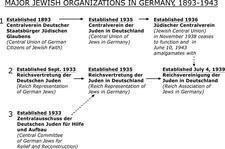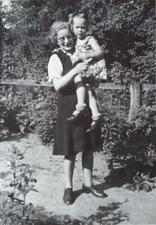
Berlin Salons: Late Eighteenth to Early Twentieth Century
The Berlin salons that developed in the late eighteenth century owed both their existence and the form of their development to Jewish women. These salons have variously been criticized as a symptom of failing Jewish tradition or welcomed as a phenomenon of emancipation and acculturation. Regardless, their importance as highlights of the salon culture and for the process of women’s emancipation in Germany cannot be denied.

Fanny Berlin
A courageous, motivated pioneer in medicine, in the late 1800s Fanny Berlin became one of the first Jewish women to practice surgery in the United States and the respected chief surgeon of a major hospital.
Rayna Batya Berlin
Rayna Batya Berlin was a Lithuanian woman committed to religious study who argued that women should be able to study the Torah and the Talmud. The only source of her life was written by her nephew, who describes her frustration with her subjugated status in her community and how she generally suffered in silence.

Cora Berliner
Cora Berliner was an economist and social scientist who held leadership positions in several major Jewish organizations in Germany between 1910 and 1942. These organizations included the Association of Jewish Youth Organizations in Germany, the Reich Representation of German Jews, and the League of Jewish Women.
Gail Berman

Rochel Berman

Sabina Berman
Sabina Berman is a Mexican-Jewish playwright, screenwriter, film director, author, poet, and journalist. Considered Mexico’s most successful and critically acclaimed playwright alive, her plays have been staged internationally and her novels have been translated into eleven languages and published in over 33 countries.

Clementine Bern-Zernik
A lawyer by training, Vienna-born Clementine Bern-Zernik produced broadcasts for the US Office of War Information in London during the war, served as the director of a Displaced Persons Camp in post-war Germany, and spent the last 50 years of her life as a UN liaison to the New York Public Library. Throughout her life she maintained a strong Austrian identity and was a founding member of the Austrian-American Federation.
Jessie Bernard
Sociologist Jessie Bernard’s feminist epiphany came at age 67 in 1969, but her earlier work anticipated feminist theory by discussing the differences between men’s and women’s experiences and arguing that quantitative studies did not accurately represent women’s stories.

Anne Fleischman Bernays
Anne Fleischman Bernays is an American editor, novelist, and nonfiction writer. Her literary work is notable for its exploration of Jewish experiences of America, the pressure of assimilation, and the then-taboo subject of sexual harassment.

Yara Bernette
Raised in Brazil, world-renowned pianist Yara Bernette began studying piano with her uncle, a major Brazilian classical musician of his day. She toured across the world and became the head of the piano program at the Hamburg Music and Performing Arts School.
Dorothy Lehman Bernhard

Sarah Bernhardt

Aline Bernstein
Aline Bernstein was one of the first theatrical designers in New York to make sets and costumes entirely from scratch and craft moving sets. She designed sets for the Theatre Guild and various independent producers, winning numerous awards for her work, including a Tony for costume design for Regina in 1949. She later founded the Costume Museum and began writing fiction.

Amy Bernstein

Bonnie Bernstein

Felicie Bernstein
Felicie Bernstein was one of the last Berlin salonnières, a patron of modern art and artists, and a philanthropist who supported early feminism.
Rebecca Thurman Bernstein
Rebecca Thurman Bernstein was lauded by local and national organizations for her efforts to improve health care, literacy, and Jewish life in Portland, Maine. Bernstein was proud of her Jewish heritage and worked for many Jewish causes, but her interests were not limited to or by her Jewishness.

Theresa Bernstein
Painter, printmaker, teacher, poet, celebrated raconteur, and art activist, Theresa Bernstein was an enduring fixture in the art worlds of New York and the summer colony at Gloucester, Massachusetts, for ninety years. Her paintings and prints are now in museums across the country, including the Metropolitan Museum of Art and the Smithsonian Institution.

Miriam Bernstein-Cohen
Miriam Bernstein-Cohen was an influential actor, director, poet, and translator in Europe and Israel. She was a versatile actor, appearing successfully both in comedies and in serious plays with the Ohel, Matateh, and Haifa Municipal Theater companies. In addition to her theater work, she wrote books and essays on theater and literature throughout her life.

Angelica Berrie

Deborah Bertonoff
From her debut at age nine through her performances in her late seventies and teaching into her late eighties, Deborah Bertonoff made dance her life’s work. Bertonoff began studying at the Bolshoi School before moving to Israel and joining the Habimah Theater. After studying dance in Europe she began choreographing, and in 1944 she founded a dance studio. She was honored with the 1991 Israel Prize.

Beruryah

Betty Berzon

Eva Besnyö
Photographer and photojournalist Eva Besnyö was born in Budapest in 1910. In the 1930s Besnyö moved to Berlin, where she quickly became successful with numerous exhibitions and commissions and spent time with politically engaged intellectuals and artists. Following the war, Besnyö was active in the Dolle-Mina feminist movement and was awarded the Dr. Erich Salomon Award for her life’s work.


